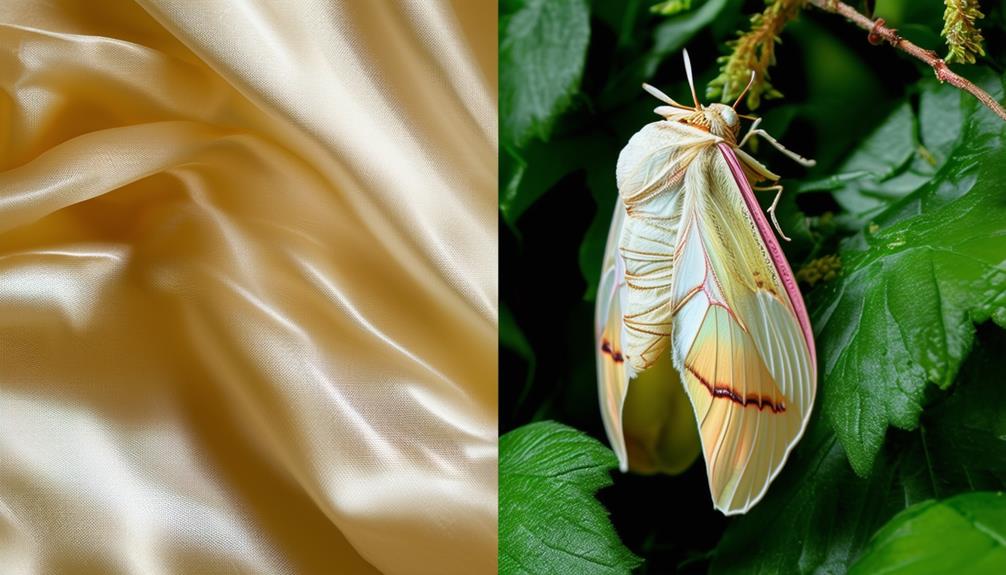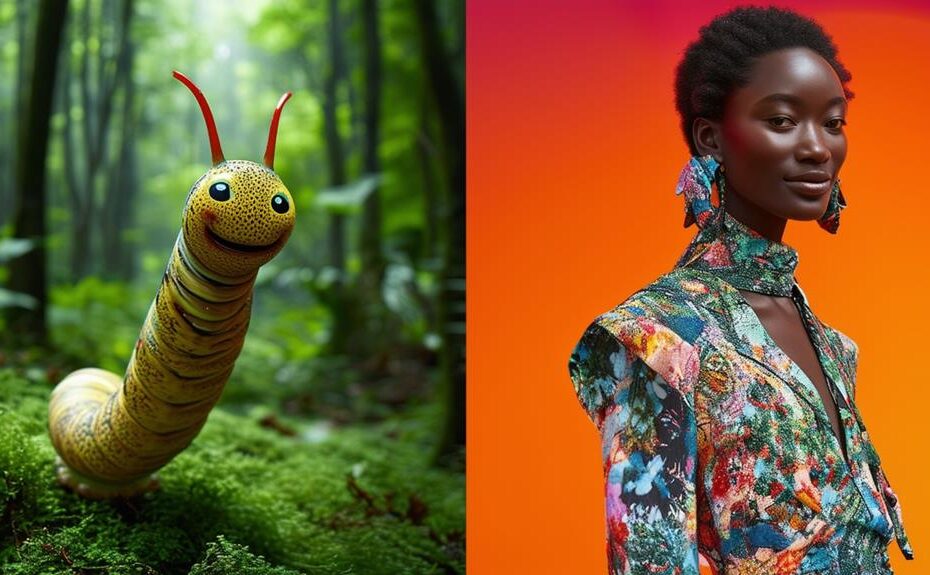You've likely heard of viscose, a fabric that mimics the luxurious feel and appearance of silk, but did you know that it's crafted from dissolved wood pulp fibers, making it a plant-based and cruelty-free alternative to silk? Viscose is often considered vegan-friendly since it's derived from trees, eucalyptus, and bamboo, and doesn't involve animal-derived materials. Although some manufacturing processes might use non-vegan chemicals, the fabric itself is free from animal exploitation. As you investigate the world of sustainable fabrics, you'll learn more about viscose's eco-friendly properties and the intricacies of its production process.
Silk-like Viscose Fabric Explained
What makes viscose fabric so remarkable is its uncanny ability to mimic the luxurious feel and appearance of silk, yet it's derived from a completely different source.
You might be wondering, how does it achieve this? Well, viscose fabric is a clever alternative to silk, offering a similar softness and luster without using animal-derived materials. This makes it an attractive option for those who prioritize ethical fashion.
By dissolving wood pulp to create fibers, viscose fabric is crafted, boasting a silk-like texture that's hard to distinguish from the real thing. As a result, you can enjoy the luxurious feel of silk without compromising your values.
Whether you're a vegan or simply someone who cares about the environment, viscose fabric is an excellent choice. Its plant-based origin and biodegradable properties make it an eco-friendly option that aligns with your values.
Viscose Fabric's Animal-Derived Roots
As you delve into the origins of viscose fabric, you'll find that it's often blended with lyocell or has wood pulp as a base ingredient – but don't worry, these components aren't derived from animals.
You might be wondering how these ingredients contribute to the fabric's comprehensive properties, and we'll get into that next.
Let's take a closer look at how these components shape the characteristics of viscose fabric.
Lyocell Viscose Blend Options
As you investigate lyocell viscose blend options, you'll want to understand the components that make up this fabric.
The production process involves a combination of ingredients, including:
- a wood pulp mixture base,
- sodium hydroxide added later, and
- carbon disulfide added to create the final product.
Understanding these components is essential in determining whether lyocell viscose blends align with your vegan values.
Wood Pulp Mixture Base
You might be surprised to learn that the wood pulp mixture base of viscose fabric has a fascinating history, with its roots tracing back to the early 20th century.
The wood pulp is harvested and processed to extract cellulose, which is then converted into fibers.
This plant-based cellulose is what makes viscose a vegan-friendly fabric option, free from animal-derived materials.
Sodium Hydroxide Added Later
While the plant-based cellulose in viscose fabric secures its vegan-friendly status, the production process involves adding sodium hydroxide, a chemical that raises questions about the fabric's animal-derived roots.
You might know sodium hydroxide by its other name, caustic soda. Rest assured, this chemical, along with other chemicals used, is vegan-friendly and doesn't contain animal-derived ingredients.
Carbon Disulfide Added
Carbon disulfide, a toxic chemical used in traditional viscose production, raises concerns about the fabric's vegan status due to its potential animal-derived roots.
You might be surprised to learn that this chemical is used to break down cellulose, a natural polymer found in plant cell walls.
Opting for lyocell-based viscose blends can guarantee a vegan-friendly choice, free from toxic chemicals.
Wood Pulp Base Ingredients
When you delve into the world of viscose fabric, you might wonder what makes it vegan-friendly. The answer lies in its wood pulp base ingredients, which are sourced from different tree species.
Let's take a closer look at three key sources:
- Softwood Tree Pulp Extract,
- Eucalyptus Tree Pulp Extract, and
- Bamboo Tree Pulp Extract.
Softwood Tree Pulp Extract
You might be surprised to learn that the production of viscose fabric begins with a seemingly unlikely source: softwood tree pulp extract, which serves as the foundation for creating this popular, vegan-friendly textile.
This plant-based material is extracted from softwood trees, emphasizing viscose's natural, cruelty-free origins. The softwood tree pulp extract is then processed into fibers, making viscose a truly vegan fabric option.
Eucalyptus Tree Pulp Extract
Eucalyptus trees, prized for their rapid regrowth, provide the pulp extract that serves as the foundation for viscose fabric, a surprising twist in the narrative of this seemingly vegan-friendly textile.
You'll find that eucalyptus tree pulp is sourced from regenerative trees, making it a sustainable and cruelty-free option.
This plant-based material aligns with vegan principles, ensuring a guilt-free fashion choice.
Bamboo Tree Pulp Extract
While eucalyptus trees provide a sustainable source of viscose fabric, bamboo tree pulp extract offers a comparably eco-friendly alternative, and its production process is worth exploring.
You'll find that bamboo viscose is made by dissolving cellulose fibers from bamboo trees, creating a plant-based and vegan-friendly fabric.
This eco-friendly option aligns with vegan principles, making it a great choice for those who prioritize sustainable and cruelty-free fashion.
Silk Finish Uses Silk

When you delve into the world of viscose fabrics, you might ponder what makes silk finish viscose so special.
However, you should be aware that some silk finish treatments involve using silk worm cocoon extract, which might raise some eyebrows.
You'll want to take into account the potential health risks associated with carbon disulfide, a chemical used in some silk finish processes, as you weigh the pros and cons of choosing viscose with a silk finish.
Silk Worm Cocoon Extract
As you delve into the world of silk and its alternatives, you'll likely come across terms like Silk Worm Cocoon Extract, which might raise questions about its vegan status.
To better understand this, let's take a closer look at three key points:
- Sericulture By-Products Used,
- Silk Worm Cocoon Extract, and
- Silk Worm Cocoon Protein.
Sericulture By-Products Used
You might be surprised to learn that some fabric finishes, including silk finish, rely on sericulture by-products, such as silk worm cocoon extract, which raises questions about their vegan status.
When opting for sustainable fabrics, it's crucial to take into account animal products used in production. Unlike viscose, silk involves exploiting animals, making it non-vegan.
Silk Worm Cocoon Extract
Silk finish often relies on silk worm cocoon extract, a by-product that raises concerns about animal exploitation in the production of some fabrics.
You might be surprised to know that viscose, on the other hand, is derived from plant-based cellulose sources, making it a cruelty-free alternative.
Viscose offers a silk-like finish without the need for silk worm cocoon extraction.
Silk Worm Cocoon Protein
This luxurious fabric finish is achieved through the use of silk worm cocoon protein, directly supporting the exploitation of these tiny creatures, making it a non-vegan choice.
You can opt for a vegan alternative, like viscose, which doesn't involve silk worm cocoon protein or harm animals in its production process.
Carbon Disulfide Health Risks
As you delve into the world of viscose production, you're likely to come across some alarming facts about the chemicals used in the process. Specifically, you'll want to take a closer look at the health risks associated with carbon disulfide, a key component in viscose production.
Here are three vital points to ponder:
- Methylamine solvent risks exposure,
- Methyl chloride solvent risks, and
- Dimethylformamide solvent risks, which all pose significant threats to worker health and safety.
Methylamine Solvent Risks Exposure
You're likely unaware that the production of viscose fabrics, touted as a sustainable alternative, involves the use of methylamine solvent, which poses significant risks to workers and the environment.
Exposure to this solvent can lead to serious health risks, including respiratory problems and skin irritation.
As a consumer, it's crucial to take into account the potential health risks associated with methylamine solvent in viscose production.
Methyl Chloride Solvent Risks
In conjunction with methylamine, viscose production also involves the use of methyl chloride solvent, which poses its own set of health risks, particularly for workers handling silk finishing agents.
You should be aware that exposure to methyl chloride can lead to serious health problems, making it essential to prioritize worker safety and consider the environmental impact of viscose production.
Dimethylformamide Solvent Risks
When managing viscose production, you're likely to encounter dimethylformamide, a solvent that poses significant health risks to workers and the environment, while also raising concerns about the use of silk finishing agents that may contain animal-derived components.
| Solvent | Health Risks | Environmental Impact |
|---|---|---|
| Dimethylformamide | Neurological, reproductive issues | Water, air pollution |
| Carbon Disulfide | Neurological, reproductive issues | Water, air pollution |
| Silk Finishing Agents | Unknown health risks | Unknown environmental impact |
As a vegan, understanding the production process and potential health risks associated with dimethylformamide solvent is crucial for making informed choices about the fabric's vegan status.
Formaldehyde Solvent Risks Exposure
Formaldehyde's use in viscose production as a solvent to achieve a silk-like finish exposes workers to significant health risks, including cancer and respiratory problems.
You mightn't know that formaldehyde is used in the production process to create that smooth, silky texture.
This exposure can have devastating effects on workers' health, highlighting the importance of evaluating the environmental and social impact of viscose production.
Viscose's Veganism Paradox Unraveled
As you investigate the world of vegan fashion, you might assume that viscose, being plant-based, is unquestionably vegan – but there's more to the story.
At the outset, viscose seems like a perfect fit for vegan fashion enthusiasts. Derived from plant-based cellulose, viscose is inherently cruelty-free and animal-friendly, aligning with vegan principles. The manufacturing process of viscose doesn't involve any animal by-products or harm to animals, making it a popular choice for those who prioritize sustainability and ethics in their fashion choices.
However, the paradox arises when you consider the manufacturing process. While viscose itself is vegan, the production process mightn't be entirely cruelty-free. Some manufacturers might use chemicals or solvents that aren't vegan-friendly, which can blur the lines of what it means to be Viscose Vegan.
It's crucial to dig deeper into the production process to verify that the viscose you're choosing is, in fact, vegan. By doing so, you can confidently opt for viscose as a sustainable, eco-friendly, and animal-friendly alternative to animal-derived fabrics like silk.
Frequently Asked Questions
Is Viscose an Animal Fiber?
You're wondering if viscose is an animal fiber, and the answer is no, it's not! Viscose is actually made from plant-based cellulose, making it a synthetic fiber that's cruelty-free and animal-friendly.
What Is Viscose Made Of?
You're wondering what viscose is made of – it's actually made from plant-based cellulose, typically sourced from fast-growing trees like pine, beech, or eucalyptus, which is then dissolved in chemicals to extract cellulose for fiber production.
Does Viscose Come From a Plant?
You're wondering if viscose comes from a plant? Yes, it does! Viscose is derived from plant-based cellulose, typically sourced from regenerative trees like pine, beech, or eucalyptus, making it a plant-based fabric.
Is Viscose 100% Cellulose?
You're wondering if viscose is 100% cellulose, but it's not – it undergoes chemical processing, breaking down cellulose into a viscous solution, making it a semi-synthetic fiber, not purely cellulose.
Conclusion
So, is viscose vegan?
The answer is complex. While viscose fabric itself doesn't contain animal products, its production involves animal-derived components. The silk finish, which gives viscose its signature smoothness, is made from actual silk. This means that, technically, viscose isn't entirely vegan.
However, it's often viewed as a more sustainable, eco-friendly alternative to silk. Ultimately, whether or not to regard viscose as vegan depends on your personal definition of veganism.
